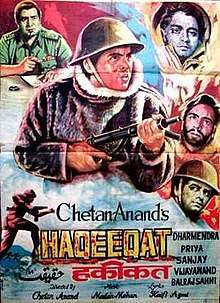Haqeeqat (1964 film)
Haqeeqat (lit. Reality) is a 1964 Hindi war-film directed by Chetan Anand. The film stars Dharmendra, Balraj Sahni, Priya Rajvansh, Sudhir, Sanjay Khan and Vijay Anand. The music is by Madan Mohan and the lyrics by Kaifi Azmi. The movie was based on the 1962 Sino-Indian War. It won the National Film Award for Second Best Feature Film in 1965.
| Haqeeqat | |
|---|---|
 Film poster | |
| Directed by | Chetan Anand |
| Produced by | Chetan Anand |
| Written by | Chetan Anand |
| Starring | Dharmendra Balraj Sahni Priya Rajvansh Sanjay Khan Vijay Anand Jayant Sudhir |
| Music by | Madan Mohan Kaifi Azmi (lyrics) |
| Cinematography | Sadanand |
| Edited by | M. D. Jadhav Rao |
| Distributed by | Himalaya Films |
Release date | 1964 |
Running time | 184 min. |
| Country | India |
| Language | Hindi |
The film was screened retrospective on August 12, 2016 at the Independence Day Film Festival jointly presented by the Indian Directorate of Film Festivals and Ministry of Defense, commemorating 70th Indian Independence Day.[1][2]
Plot
Set against the Sino-Indian War of 1962, the film's main plot concerns a small platoon of Indian soldiers in the hilly terrain of Ladakh. Captain Bahadur Singh (Dharmendra) is a keen young soldier who falls in love with a Ladakhi girl, Angmo (Priya Rajvansh), while posted in the region. Bahadur Singh takes Angmo's brother Sonam under his wing as the boy dreams of becoming a soldier one day.
On a visit to Kashmir and Ladakh, Bahadur Singh's father, Brigadier Singh (Jayant), receives news of creeping encroachment by Chinese troops along the border and orders Major Ranjit Singh (Balraj Sahni) to send his officers to secure the posts. Thus begins the struggle of the soldiers, who await further instructions while facing a wily adversary.[3]
Production
Parts of the film were shot on location in Ladakh, thus becoming the first Bollywood film to be shot there.[4]
Cast
- Balraj Sahni as Major Ranjit Singh
- Dharmendra as Captain Bahadur Singh
- Priya Rajvansh as Angmo
- Sanjay Khan as Indian Soldier
- Vijay Anand as Major Pratap Singh
- Sheikh Mukhtar as Commanding Officer
- Sudhir as Ram Singh
Awards
- 1965: National Film Award for Second Best Feature Film: Haqeeqat[5]
- Filmfare Best Art Direction Award for M. S. Sathyu[6]
Music
The music of this film has several notable songs. All songs are written by Kaifi Azmi and the music is composed by Madan Mohan.[7]
| # | Song | Singer |
|---|---|---|
| 1 | Hoke Majboor Mujhe Usne Bhulaya Hoga | Mohammed Rafi, Talat Mahmood, Manna Dey, Bhupinder Singh |
| 2 | Ab Tumhare Hawaale Watan Saathiyon | Mohammed Rafi |
| 4 | Masti Mein Chhedke Tarana Koi Dil Ka | Mohammed Rafi |
| 7 | Main Ye Sochkar Uske Dar Se Utha Tha | Mohammed Rafi |
| 3 | Zara Si Aahat Hoti Hai To Dil Sochta Hai | Lata Mangeshkar |
| 5 | Khelo Naa Mere Dil Se O Mere Saajana | Lata Mangeshkar |
| 6 | Aai Ab Ki Saal Diwaali Munh Par Apne Kun Male | Lata Mangeshkar |
The song "Ab Tumhare Hawaale Watan Saathiyon" sung by Mohammed Rafi has become synonymous with patriotism in India.[8]
References
- "Pune: A film festival that celebrates freedom". The Indian Express. 9 August 2016. Retrieved 1 August 2019.
- Independence Day 15 August 2016
- Kahlon, Sukhpreet (17 August 2018). "'Desh ko tumhari zaroorat hai' – The patriotic zeal in Chetan Anand's Haqeeqat (1964)". Cinestaan.com. Retrieved 1 August 2019.
- https://www.thebetterindia.com/122341/ladakhs-dry-toilets/
- Dilip Hiro (2015). The Longest August: The Unflinching Rivalry Between India and Pakistan. Nation Books. p. 449. ISBN 1568585039.
- S. M. M. Ausaja (2009). Bollywood in Posters. OM Books International. p. 1963. ISBN 818710855X.
- Namrata Joshi (22 October 2012). "'The Music Had To Be Pathos-Laden'". Outlook.
- Sujata Dev. Mohammed Rafi Voice Of A Nation. OM Books International. ISBN 9380070977.